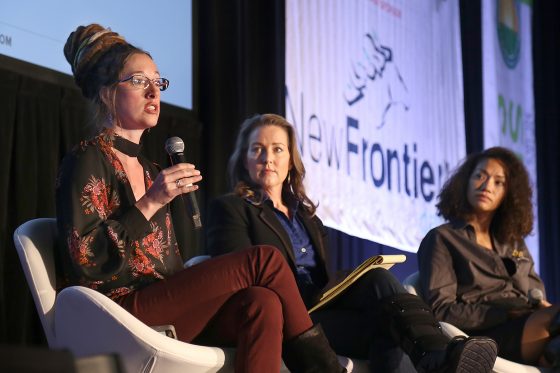The cannabis industry is in a unique position to reshape and redefine Corporate Social Responsibility by creating a better version of so-called “corporate citizenship”– and making it the new standard in a rapidly growing sector.
Industry leaders examined how CSR, a corporation’s efforts to assess and take responsibility for its impacts on the environment and society, can boost the cannabis sector’s image and bottom line Thursday during a keynote panel at the National Cannabis Industry Association‘s Seed to Sale Show in Denver.
Laura Day Rivero, Operations Manager at Yerba Buena, an Oregon-based cannabis cultivator, encouraged her audience to see themselves “at the precipice of this brand new movement, this brand new industry, where we have the power to design it from the inside out.”
“The only way we get to do that is by running our businesses in a positive and exemplary way,” she said. “And I like to think that the cannabis industry can redefine what it means to be a business.”
Cylvia Hayes, Chief Sustainability Officer at the Deschutes Growery in Oregon, told the NCIA audience that her company didn’t start out with a commitment to sustainability just because they were do-gooders. “They started down that path because they wanted to deliver the best quality, craft cannabis,” she said. “And they believe that they are doing that through this process.”
Cannabis, of course, isn’t alone in focusing on CSR in 2018
Susan McPherson expanded on the idea of CSR in a recent article in Forbes. She forecasts that companies will become more involved in, among a variety of issues, ending workplace harassment and inequality, expanding diversity and focusing on “brand activism.”
“There’s no turning back,” she added. “In 2018, the expectation is that companies will continue to expand their activism on, and investment in, the issues that matter to their employees, customers and communities.”
Effective marketing of a company’s values can, indeed, become a valuable form of brand activism and advertising, Day Rivero said, one that teaches the public about what sets a brand apart and why consumers should care about such things as fair labor practices at a cannabis firm.
“If you don’t preach it, if you don’t advertise these things as elements that are important to care about, people don’t even know they exist or that companies are doing them,” she noted.
When asked by an audience member Thursday what would keep Big Marijuana from becoming Big Pharma, Jeannette Horton, vice president at the cannabis compliance software firm MJ Freeway, had a one-word answer.
“Us,” she said to applause. “That’s why we’re all here. We believe we can make it different, and if it’s not us, then who? But we’ve got to fight like hell, y’all.”
Hayes agreed, saying that the opportunities to create the kind of legal cannabis industry that many people want to see successfully brought into existence will require constant vigilance.
“We’ll be more effective with that if we don’t adopt a dog-eat-dog, barriers-up approach,” she said. “The new economy is a collaborative economy, and if we move in that direction en masse we’ll have much greater opportunity.”
Related: Five years after Amendment 64, Colorado’s marijuana crop is getting greener
But it’s easier to successfully have CSR and sustainability in a cannabis company, she added, “If you embed it in the DNA of the company from the get-go. You can go back and retrofit, but it’s so much easier. You also have a chance to have employees have ownership in it. So when we developed our corporate culture guidebook, our employees were part of it.”
After the event, Horton told The Cannabist that the industry needs to prioritize educating the general public to the financial, medical and social benefits of the legal cannabis industry, and to combating false and misleading stories that chip away at those accomplishments.
“We just assume everyone’s on board, because there’s this Gallup Poll that say everyone wants it legal and states keep legalizing,” she said. “If we just assume that it’s all good we’re going to take our eye off the ball and this industry is going to evolve in a way that we don’t agree with. So we need to be really on top of image, and really on top of saying ‘Who is this industry?’ — so that it shapes in the way we want it to go.”


